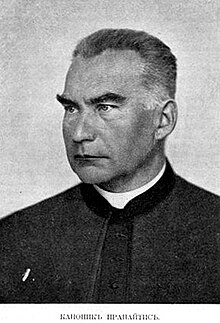Justinas Bonaventūra Pranaitis
Justinas Pranaitis , also Justinus Bonaventūra (born July 27, 1861 in Panenupiai near Griškabūdis , Suwalki Governorate , Russian Empire ; † January 28, 1917 in Petrograd ) was a Lithuanian Roman Catholic priest and anti-Semite .
Live and act
Pranaitis was the child of Lithuanian farmers. He attended the humanistic grammar school in Marijampolė and from 1878 the seminary in Sejny .
After he was ordained a priest in 1886, he received a master's degree in theology from the Spiritual Academy in Saint Petersburg the following year , where he took over the editing of the Hebrew language . He was a student of the Semitist Daniel Chwolson , who taught oriental languages at the University of St. Petersburg.
In 1890 Pranaitis was appointed chaplain and was prefect from 1891 to 1893 . He taught Hebrew, liturgy, church singing and gave religious instruction, also in Lithuanian. He set up an orphan asylum on Vasily Island (St. Petersburg). Because of a fraud scandal, he was briefly at the Tver banned, but soon rehabilitated and received by Tsar Nicholas II. The Order of Saint Stanislaus 3rd Class.
Impressions from trips to Catholic parishes in Nizhny Novgorod , Siberia and Turkestan made him a pastor and missionary . He went to Tashkent as a priest in October 1902. Under his influence, churches and meetinghouses were built in Ashgabat , Bukhara , Samarkand , Alma-Ata and Tashkent . He also toured Manchuria , Sakhalin and Japan . In 1915 he became chairman of the Roman Catholic Welfare Society in Turkestan and went to St. Petersburg in 1916 because of an illness, where he died in January 1917. Anti-Semitics also speculated that he was murdered, as his death coincided with the unrest in the weeks leading up to the February 1917 Revolution .
anti-Semitism
Pranaiti was interested in the Jewish religion, the Talmud and, in his opinion, closely related Freemasonry . In 1892 he published the script Christianus in Talmude Iudaeorum sive Rabbinicae doctrinae de Christianis secreta , which was developed from his dissertation in 1886 , which is ecclesiastically imprinted , later translated and since then published (today popularized as Talmud unmasked ). After a breakdown of the individual writings of the Talmud and the history of their origins, he particularly looks at the relationship to non-Jews in the legal texts. In the interpretation he referred to anti-Talmudists like Jakob Ecker and August Rohling and tried with many Hebrew-Latin comparisons to prove that Jews are obliged by the Talmud to harm Christians and to pursue their extermination. The work is now indexed in many countries .
Beilis trial
In 1912 he was appointed as an alleged Talmud specialist as an expert witness in the trial of the so-called Beilis affair , in which the Jewish clerk Mendel Beilis (Bejlis) was charged with the ritual murder of a Christian child who had been found with numerous stab wounds . His report was intended to confirm the prosecutors. However, his competence was called into question by the jury, as he could not correctly assign any of the Hebrew words from the Talmud presented to him in the questioning, as the shorthand transcript of the trial shows:
- Question: What is the meaning of the word Hullin ?
- Pranaitis: I don't know.
- Question: What is the meaning of the word Erubin ?
- Pranaitis: I don't know.
- Question: What is the meaning of the word yebamot ?
- Pranaitis: I don't know.
- Question: When did Baba Batra live and what did she do?
- Pranaitis: I don't know.
"" The final question - similar to asking an alleged resident of London, 'Who was Victoria Station and what did it do?' - was decisive when it was explained to the jury. Baba Batra is a treatise of the Talmud that was well known to scholars, students and also many Jewish lay people. "
The accused Beilis was imprisoned for two years before he was acquitted. The process attracted worldwide attention.
literature
- Justin B. Pranaitis: Christianity in the Talmud of the Jews or the mysteries of rabbinical teaching about Christians. Translated and expanded by Joseph Deckert . Publishing House of the Messenger of St. Joseph, Vienna 1894.
- Michael Hagemeister : Justinas Bonaventūra Pranaitis. In: Biographisch-Bibliographisches Kirchenlexikon (BBKL). Volume 21, Bautz, Nordhausen 2003, ISBN 3-88309-110-3 , Sp. 1221-1226.
- Rebekah Marks Costin: Mendel Beilis and the blood libel. In: Robert A. Garber (Ed.): Jews on Trial. Ktav, Jersey City NJ 2004, ISBN 0-88125-868-7 , pp. 69-93.
- Michael Hagemeister: Pranaitis, Justinas. In: Richard E. Levy (Ed.): Antisemitism. A Historical Encyclopedia of Prejudice and Persecution. Volume 2: L - Z. ABC Clio, Santa Barbara CA et al. 2005, ISBN 1-85109-439-3 , p. 564 f.
- Christina Nikolajew: On the connection between national identity formation and the Catholic Church in Lithuania. In the second half of the 19th century to the beginning of the 20th century. sn, Tübingen 2005, pp. 172-209: Chap. 3.2: Jews in Lithuania. (Tübingen, University, dissertation, 2005; full text ).
Footnotes
- ↑ Michael Hagemeister: Justinas Bonaventūra Pranaitis. In: Biographisch-Bibliographisches Kirchenlexikon (BBKL). Volume 21, Bautz, Nordhausen 2003, ISBN 3-88309-110-3 , Sp. 1221-1226.
- ↑ Shorthand transcription of the trial, quoted from Rebekah Marks Costin: Mendel Beilis and the blood libel. In: Robert A. Garber (Ed.): Jews on Trial. Princeton 2004, pp. 69-93, here p. 87 .
- ^ Rebekah Marks Costin: Mendel Beilis and the blood libel. In: Robert A. Garber (Ed.): Jews on Trial. Princeton 2004, pp. 69-93, here pp. 87 f.
Web links
| personal data | |
|---|---|
| SURNAME | Pranaitis, Justinas Bonaventūra |
| ALTERNATIVE NAMES | Pranaitis, Justinas; Bonaventūra, Justinus |
| BRIEF DESCRIPTION | Lithuanian Roman Catholic priest and anti-Semite |
| DATE OF BIRTH | July 27, 1861 |
| PLACE OF BIRTH | Panenupiai near Griškabūdis , Suwalki Governorate , Russian Empire |
| DATE OF DEATH | January 28, 1917 |
| Place of death | Petrograd |
